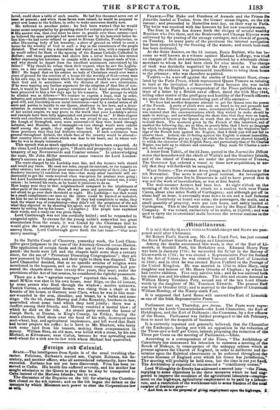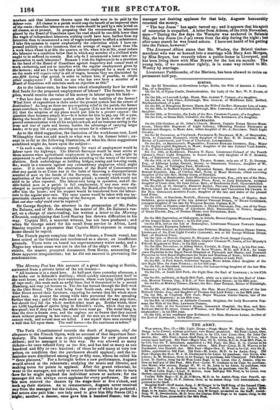It is said that the Qaeen's visits to Strathfieldsay - e and
Stowe are post- poned until after Christmas.
Sir Robert Peel's fourth son, Mr. Jilin Floyd Peel, has just entered the Scots Fusileer Guards as Ensign and Lieutenant.
Among the deaths announced this week, is that of the Earl of Li- merick, at Southill Park, his Berkshire seat. Edmund Henry Pery was born in January 1758 ; he succeeded his father in the Barony of Gleutworth in 1794 ; he was elected a Representative Peer for Ireland by the Act of Union ; he was created Viscount and Earl of Limerick in 1803 ; and in 1814 he was created Baron Foxford in the Peerage of the United Kingdom. He was married in 1783 to Alice Mary, only daughter and heiress of Mr. Henry Ormsby of Cloghan ; by whom he had twelve children. Five only survive him ; and he has outlived both his eldest son and his eldest grandson. The title and estates descend to William Henry Tennison Pery, second son of the late Lord Glenta worth by the daughter of Mr. Tennison Edwards. The present Ead was born in October 1812 ; and is married to the daughter of Lieutenant William Horsley, of the Ninety--sixth Foot.
It is supposed that Lord Hasse will succeed the Earl of Limerick as one of the Irish Representative Peers.
Parliament met on Thursday, pro forma. The Peers were repre- sented by the Lords Commissioners—the Lord Chancellor, the Earl of Haddington, and the Earl of Dalhousie ; the Commons, by a few officers of the House. Parliament was farther prorogued to the 4th February; then to meet for the despatch of business.
It is currently reported and generally believed, that the Chancellor of the Exchequer, having met with no opposition in the reduction of the Three-and-a-half per Cents, intends proposing the reduction of thb Three per Cents on the meeting of Parliament.—Globe.
According to a correspondent of the Times, " The Archbishop of Canterbury has announced his intention to summon a meeting of the Bench of Bishops, in consequence of the unhappy schism which at present agitates the Church of England, in order to deliberate and de- termine upon the Rubrical observances to be enforced throughout the various dioceses of England over which his Grace has jurisdiction." The meeting will probably be held soon, but the time is not yet fixer The Archbishop is expected to recommend a "conciliatory course."
Lord Willoughby de Eresby has addressed a second lette the nisei, replying to some objections to the three measures which he had sug- gested to improve the condition of the agricultural labourers--emplop. meat on the highways, agricultural employment to be paid by a labour- rate, and a restriction of the workhouse-test to some fraction pith. egg number of destitute poor- " Aod fans, m to the poroposil of !Aviv estp/opowat upon the lighwegs. Sowbere said that labourers thrown upon the roads were to be paid by the iaboar-rate. All classes in a parish would reap the benefit of an improved state of the road.; therefore labourers on the roads should be paid by a rate levied on all classes, as at present. In proposing that the remuneration to labourers placed by the Board of Guardians upon the road should be one-fifth lower than She wages of independent labourers, nothing could have been further from my 'intention than to recommend a rate of wages inadequate to afford a subsistence. take this occasion to repeat emphatically the conviction which I have ex- pressed publicly on other occasions, that an average of wages lower than 12s. a week when wheat is at 60s. the quarter, or 10s. when it is at 50s., must reduce She labourer to a condition below that in which any member of a civilized state sought to be suffered to remain. But why do I recommend a lower rate of re- muneration to such labourers? Because 1 wish the highways to be a provision in the hand of the Board of Guardians against temporary and casual want of 'work exclusively, and not to interfere with the regular employment given by the farmers; and am Ito be told that a labourer employed for a week or two On the roads will require relief in aid of wages, because they are diminished by one-Mh during that period, in order to induce him, if possible, to obtain ,other employment ? I think no one who has ever been a member of a ,Board of Guardians will entertain such an objection as this."
As to the labour-rate, he has been asked triumphantly how he would And funds for the proposed employment of labour? The farmer, he re- Oka, would receive the value of his money in labour upon his land- " Bat bow does the present system allow for the inability of the farmer ? What limit of expenditure is there under the present system but the extent of ,destitution ? As long as there are any requiring relief in the parish, the farmer must contribute to their support. I will suppose (I do not for a moment grant it) that the adoption of my plans would put him to a greater expense : the question then becomes simply this—Is it better for Lim to pay, say 121. a-year, liaving the benefit of labour to that amount upon his land, or else of an im- proved communication with all his neighbourhood, and an immense saving in the wear and tear of carts and horses, besides the advantage of carrying larger loads; or to pay 101. a-year, receiving no return for it whatever?"
As to the third suggestion, the limitation of the workhouse-test, Lord Willoughby does not add much to what was in his former letter ; ex- cept in so far as the following illustration, of what his three suggestions combined might do, bears upon the subject-
" In such a case, the ordinary remedy for want of employment would be labour upon the highways. The District. Surveyor would be most active at those seasons when agricultural employment is always slack ; and might be empowered to sell and purchase materials according to the wants of the several districts. Such undertakings as building bridges, raising and lowering roads, would be a resource .against any extraordinary stagnation which might occur. if it came under the observation of the Board of Commissioners ,that any parish in an Union was in the habit of throwing a disproportionate slumber of men on the hands of the Surveyor, the remedy would lie in the application of the labour-rate for a certain period; a remedy which would not seed to be often repeated. The labour-rate being in operation, and all the able-bodied men in a parish in full employment, if any man were dis- charged as incorrigibly negligent and idle, the Board, after the inquiry, would offer him the house ; and his support would be transferred from the labour- rate to the regular poor-rate. The same course would be taken with any im- practicable character in the employ of the Surveyor. It is next to impossible that out-door relief could ever be required."
Sir George Stephen, the attorney in the prosecution of Mr. Pedro De Zulueta, and of Mr. Jennings, the master of Mr. De Zulueta's ves- sel, on a charge of slave-trading, has written a letter to the Morning Chronicle, complaining that Lord Stanley has thrown difficulties in his way. Captain Hill, a material witness, has not been produced ; and when Sir George asked for his recall from service in Africa, Lord Stanley required a guarantee that Captain Hill's expenses in coming Imam should be repaid.
The French papers complain that the Curieuse, a French vessel, has been seized at the Gambia and condemned as a slaver, on insufficient grounds. There were on board ten supernumerary water-casks, and a ,Negro-boy whose name was not in the list of the ship's crew. M. Le- saistre, the master, procured documents from Goree, accounting for those apparent irregularities ; but he did not succeed in preventing the ondemnation.
The Morning Post has this account of a great fire raging at Stettin, extracted from a private letter of the 4th instant- " All business is at a stand here. At half-past three yesterday afternoon, a Are broke out in Schmidt's distillery ; which quickly communicated itself to the next house, and then to their warehouses, where were lying 5,000 quarters of rape-seed ; this made such an awful blaze that it threatened to be a second llamburg, and may yet become so. The fire has burned through the Boll-werk Co the Oder Street. The wind being from South-east, every person in the Oder Street moved their furniture, expecting for certain that the whole street must burn. At present the strong walls have prevented the fire spreading further that way ; and if the walls stand on the other side all may stop there, but should they fall the whole market-place must go. Besides which, there are 1,000 hogsheads of spirits lying in Schmidt's vaults, which they say are 4re-proof; but if they do burn, the whole town must go. The worst thing is, that the river is frozen over, and the engines are so frozen that they cannot work without pouring in hot water; and all the men are no drunk that they cannot work, and several men are killed. I saw myself three men covered by a wall that fell upon them. The mail leaves—the fire continues as before."
The Paris Constitutirmnel records the death of Auguste, chef des elagueurs to the French Opera, with an account of that important func- tionary. His business was to provide applause for new pieces and .4debuts ; and he managed it in this way. He was allowed so many tickets—he once refused forty as too few, and has had as many as one lundred and fifty or two hundred : of these he sold many at very low jprices on condition that the purchasers should applaud; and the re- mainder were distributed among forty or fifty men, whom he called his " three platoons." For a fortnight before a new performance, Auguste mould attend at the rehearsals; studying the music and libretto, and making notes for points to applaud. After the grand rehearsal, he went to the manager, not only to receive further hints, but also to learn -bow far he might applaud the individual actors or authors; for the manager did not always covet applause for every performer. He and Ids men entered the theatre by the stage-door at five o'clock, and ;took up their stations. As to remuneration, Auguste never received any from the manager but the tickets, the price of which he pocketed ; ,but actors also paid him : one lady used to give him fifty francs (21.) a %WU; another, a dancer, once gave him a hundred franca; but the
manager not desiring applause for that lady, Auguste honourably returned the money.
" The boy Jones " has again turned up; and it appears that his spirit of enterprise is ungnelled. .A letter from Athens, of the 20th November, says—" During the few days the Warspite was anchored in Salamis Bay, the boy Jones (in-I-go) swam from the ship during the night ; but after some search he was found ashore. I have not heard of his getting into the Palace, however."
The Liverpool Albion states that Mr. Wooley, the Bristol timber- merchant who was so hoaxed into a marriage with Mary Ann Morgan, by Miss Bryers, has recently taken a public-house in Liverpool, and has been living there with Miss Bryers for the last six months. The young lady, if we remember rightly, is in some way related to Mr. Wooley by marriage.
Lieutenant Puddicombe, of the Marines, has been allowed to retire on permanent half-pay.



























 Previous page
Previous page